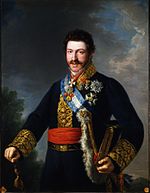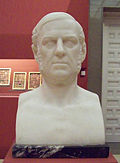Infante Francisco de Paula, Duke of Cádiz, Date of Birth, Place of Birth, Date of Death
TweetInfante Francisco de Paula, Duke of Cádiz
About Infante Francisco de Paula, Duke of Cádiz
- Infante Francisco de Paula of Spain (10 March 1794 – 13 August 1865) was an Infante of Spain and the youngest son of Charles IV of Spain and Maria Luisa of Parma.
- He was a brother of Ferdinand VII, as well as the uncle and father-in-law of Isabella II. His education at the Spanish court was derailed by the Napoleonic intervention in Spain.
- The departure of the fourteen-year-old Infante to exile in May 1808 provoked a popular uprising that was violently suppressed by French troops.
- For the next ten years, Infante Francisco de Paula lived in exile with his parents, first in Marseille and later in Rome. Infante Francisco de Paula returned to Spain in 1818, being called by his eldest brother, King Ferdinand VII, who showered him with honors and privileges.
- Interested in artistic pursuits, Francisco was an amateur singer and painter.
- In 1819, he married his niece, Princess Luisa Carlotta of Naples and Sicily, the eldest daughter of his older sister Maria Isabella.
- The couple had eleven children and were very active in political affairs.
- Luisa Carlotta was instrumental in securing the succession for Ferdinand VII's daughter, Queen Isabella II. During the regency of Isabella II, Francisco was excluded from the government by his sister-in-law, Queen Maria Christina.
- Siding with the liberals, Francisco de Paula and his wife became active in the opposition and were forced to move to France in 1838.
- They returned to Spain under the government of Maria Christina's successor as regent, General Espartero.
- As they also conspired against Espartero, they were sent back into exile. The proclamation of Queen Isabella II's majority allowed them to return.
- The Infante and his wife centered their hopes on marrying their eldest son, Infante Francisco de Asis, to Queen Isabella II.
- Luisa Carlotta died in 1844, but, under pressure from French diplomacy, Queen Isabella II married Francisco de Asis in October 1846.
- As father-in-law to his niece the Queen, Infante Francisco de Paula occupied a prominent position at court during Isabella II's reign.
- However, as he tried to intervene in politics, he was briefly exiled once again in 1849.
- In 1852, with the Queen's approval, he contracted a morganatic marriage.
- He died twelve years later.
Read more at Wikipedia


 Date of Birth:
Date of Birth:  Place of Birth: Madrid, Community of Madrid, Spain
Place of Birth: Madrid, Community of Madrid, Spain
